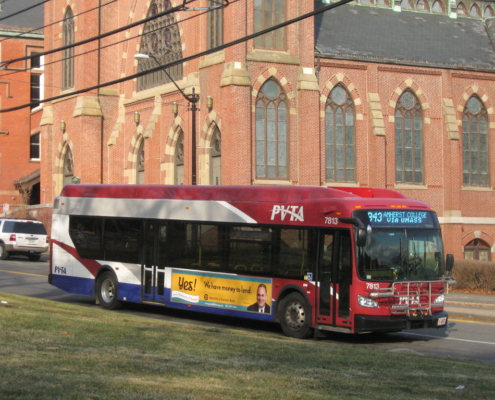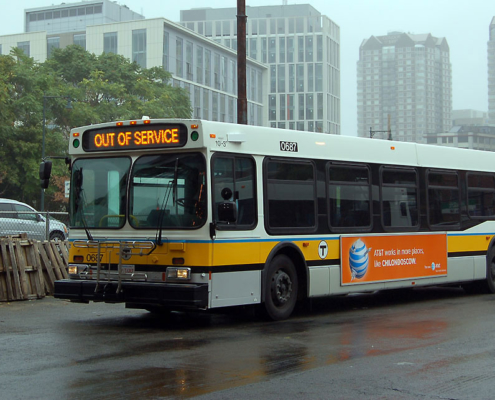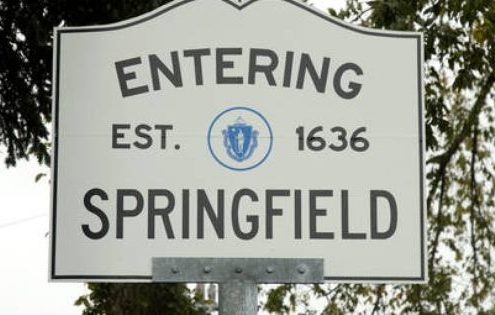
U.S. History and Civics Education: Lacking Standards, Little Knowledge
According to both the NAEP U.S. history and civics test results and a national survey emulating a U.S. citizenship test, students and citizens in America are largely lacking the mastery of the subjects. At a time when history and civics education is highly politicized, we must improve their education to ensure future generations of capable citizens.

GDP by Industry: Middlesex County v. Suffolk County
Middlesex and Suffolk counties have contributed far more to the state's GDP than any other county in Massachusetts. However, the two differ in which industries are responsible for the greatest shares of their GDP.

The Curious Case of the Missing Stabilization Funds
Stabilization funds are a key component of a municipality's financial strength, yet many towns (including Boston!) report no stabilization funds. Why is this?

HDIP: Unintended Consequences Adding to the Housing Crisis
See how the HDIP affected the state's housing crisis. Housing prices in Gateway Cities, such as Chelsea, Revere, Everett, and Lawrence, are skyrocketing.

Large Free Cash Fund in Woburn Demonstrates Quality Financial Management
Woburn has consistently had quality financial management in recent years, demonstrated by the fact that the city had the third highest free cash fund in the state in 2020. The city’s financial success has benefited its taxpayers, as the city’s bond rating has been promoted to a AAA rating by the S&P agency standards.

Can Massachusetts Reverse the Decline in U.S. History and Civics Performance?
Massachusetts — home to so much history, including seminal events such as the Boston Tea Party — has much to be proud of in its own students’ history and civics performance. Even as policymakers have supplanted typical curricular standards with “engagement” mandates that students participate in progressive activism, national attitudes towards Massachusetts’ civic education have remained envious.

Cheap, Efficient, Effective: The Lessons from the PVTA and WRTA
The MBTA is recognized as one of the best transit systems in the nation. It's not perfect, however: comparisons to other Massachusetts transit systems can indicate the MBTA's flaws and highlight the regional authorities' strengths.

The Massachusetts Lottery Seeks Expansion
The Massachusetts Lottery is once again expanding, offering a new $50 dollar scratch ticket. Members of the House and Governor Healey have also backed a proposed FY24 budget provision creating an online lottery, or iLottery. While these measures are predicted to boost the state's revenue and ability to provide local aid, state legislators should ask themselves whether these new changes represent sound public policy and align with other policies goals.

Fare-Free Public Transit in Boston: A Holistic View
In recent years, ridership on bus routes which run through low-income areas has increased due to programs which have eliminated fares on those routes. With some politicians looking to expand this to all Boston transportation, it is important to remember that while public transit is good for society, it is not a public good.

Boston’s Budget: Wu and City Council Debate
Learn more about the details of the latest Boston operating budget proposal. Mayor Wu and City Council debate on specifics of the bill, such as cuts to different services vital to the city.

Charter School Success: Importance in Suffolk County and College Enrollment
Learn about how charter schools set students up for success, especially in urban areas like Suffolk county. MCAS scores and college enrollment are stats that point to the impact of Charter schools.

A Bird’s Eye View: Massachusetts K-12 Education by County
Massachusetts has had the best public school system in the country for the past two decades: along with some of the highest per pupil spending as well. Among the counties, does high per pupil spending translate to better results? The short answer: not really.

PFML v. FMLA: To Pay or Not to Pay Leave-Takers
Congress passed the Family and Medical Leave Act in 1993 to ensure citizens’ job security should they need to take an extended leave, but it did not require any replacement wages to be paid for that time period. Then, Massachusetts passed their Paid Family and Medical Leave law in 2018 which set out requirements for employer and employee contributions to a PFML fund so that employees could get paid in addition to keeping their jobs should they need to take leave for certain reasons.

Online Sports Betting as a Form of Tax Revenue
The legalization of sports betting in Massachusetts has been successful so far in terms of bringing in tax revenue. Although there's a chance for a dip in volume this summer, it will continue to be a strong source of revenue for the commonwealth.

A Tale of Two Massachusetts: Wealth and Labor Differences Between East and West
This blog compares the income, wealth, and property values of western Massachusetts to those of eastern Massachusetts, highlighting the west's potential for growth.

Unemployment: A Massachusetts vs. New England Comparison
Massachusetts has seen a trend of above average unemployment rates in comparison to other New England states in recent years. This may be attributed to the greater average unemployment benefit payouts, and duration of benefits, which Massachusetts has had.

Hampden County Resilience: Thriving Despite Manufacturing Decline
Hampden County has experienced decline in its manufacturing sector, a former backbone of its economy. However, the county has still experienced this in spite of this, showing growth in new sectors.

State, Regional, and National Employment Trends Point to an Aging Workforce: Part Two
This blog furthers the discussion about the aging workforce by examining how decreased employment among young people as they turn to education instead impacts the issue. Then, it explains the implications of an older workforce on the future of labor and productivity in the U.S.

State, Regional, and National Employment Trends Point to an Aging Workforce: Part One
This blog explores the factors which have contributed to observed trends of increased employment among the 65 and older demographic in Massachusetts, New England, and the United States at large, as it pertains to the aging of the workforce.

The MassLottery: A Bay Stater’s Favorite Pastime
The Massachusetts lottery made $5.9 billion in 2021, making it the fourth-highest source of revenue for the state. This confirms a long-standing trend: that Massachusettans love to play the lottery.

Massachusetts is Losing Taxpayers to More Tax-Friendly States
This post explores the difference among tax policies in Massachusetts, New Hampshire, and Florida in order to explain the increasing amount of Massachusetts residents who are migrating from the state. Tax-friendly policies are very alluring to Massachusetts residents, seeing as the state is actually increasing the personal income tax rate rather than try to lower taxes, as both New Hampshire and Florida have done.

Healthcare: Suffolk County’s Biggest Driver for Labor and Employment
Suffolk County employment and labor trends have seen steady growth over the past 15 years. The rise of establishments and employment in the health care sector has directly contributed to these trends. Suffolk County has now surpassed Worcester and Essex counties in labor force and employment numbers.

The Confounding Massachusetts Estate Tax
The estate tax has become an increasingly significant source of revenue for the Bay State in recent years. Why is this: and is it a good thing?

Massachusetts’ Misguided Middle-Class Health Insurance Subsidy Expansion
A proposal on Beacon Hill to expand insurance subsidies up to 500 percent of the federal poverty level, could push the small business insurance market into a death spiral, without reducing the number of uninsured and hurting those with preexisting conditions.

A Model for Occupational Licensing Reform in the Bay State
Licensing for many professions squeezes the supply of services, artificially inflating prices and creating wage premiums. One study from the Institute for Justice put the wage premium relative to an environment without any occupational licensing at a whopping 22 percent in Massachusetts.
 Image by Freepik.com
Image by Freepik.comA History of Rent Control Policy in Massachusetts
While many may only remember the 1994 referendum and the laws…

Corporate Ownership: A Threat to Housing Affordability?
An increase in corporate ownership of housing has some experts worried about potential consequences of such a shift. One study found a link between LLC ownership and housing stock that is in disrepair, with more rapid deterioration than would be expected if ownership had not changed.

Sunshine Week 2023: Shining Light on the Workings of Government
Pioneer Institute is proud to join with the media and others—including The Boston Herald, The Boston Globe, CommonWealth Magazine, Common Cause, and the ACLU—in marking Sunshine Week, March 12-18.

The Debate Over Rent Control Re-Emerges Amid Housing Crisis
0 Comments
/
There is a housing crisis in the Bay State, a fact unlikely to…

Happy Holidays
During this festive season, we want to wish you and your loved ones a joyous holiday and happy New Year.
